Race and Crime: Who Attacks Whom?
Jared Taylor, American Renaissance December 29, 2020
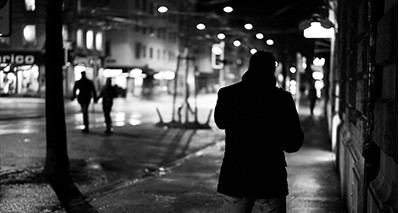
The United States keeps better statistics on race and crime than any other country in the world. However, the US Bureau of Justice Statistics has only recently begun to treat Asians as a separate category and to distinguish Hispanics from whites.
The single best source for interracial crime data is the National Crime Victimization Survey (NCVS). It is an annual survey of more than 200,000 Americans, carefully chosen to represent the whole country. Each person lists the violent crimes of which he was a victim during the previous six months, including the race, sex, and approximate age of the attacker. The crimes are rape or sexual assault, robbery, aggravated assault, and simple assault. The findings are then converted into annual figures, most of which are for single-offender/single-victim crimes only. The NCVS does not ask about murder because the victims are dead. However, the number of murders is relatively small: 16,214 in 2018, or not even 0.3 percent of the 6,386,000 people calculated by the 2018 NCVS to have been victims of violent crime.
NCVS findings are not biased by police or justice system "racism," because they are a direct survey of crime victims. Many people think statistics on arrests, convictions, and imprisonment reflect "systemic bias" and therefore cannot be trusted, but these survey data reflect the actual experiences of crime victims, unfiltered by any contact with police or the courts. The NCVS is also the only national source for crimes that are not reported to the police. Victims tell the NCVS about all crimes, and the survey finds that Americans file reports on only about half of all violent crimes.
It is possible that victims could have faulty memories, or lie. They could invent crimes, ignore actual crimes, or lie about the race or sex of the attacker. However, there is no obvious reason to lie, and year to year, the results are generally consistent, even though the survey sample changes. NCVS information is the the [sic] best we have.
The NCVS for 2018 was the first to treat Asians as a separate category, and for that reason has special value. It reports races of perpetrators and victims in Table 14, reproduced here.
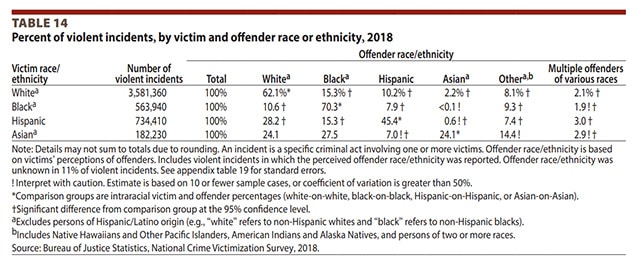
It is easy to calculate how often criminals of each race attack each other, and this information is included in the pie charts below. (Cases in which the race of the attacker was "other," and those with attackers of various races are not included.)
When whites committed violent crimes, they chose white victims nearly 90 percent of the time, and blacks only 2.36 percent of the time. However, violent criminals of every other race chose whites as victims more often than people of any other race, including their own.
Violent black and Hispanic criminals choose whites almost half the time, and Asians choose white victims 62 percent of the time.
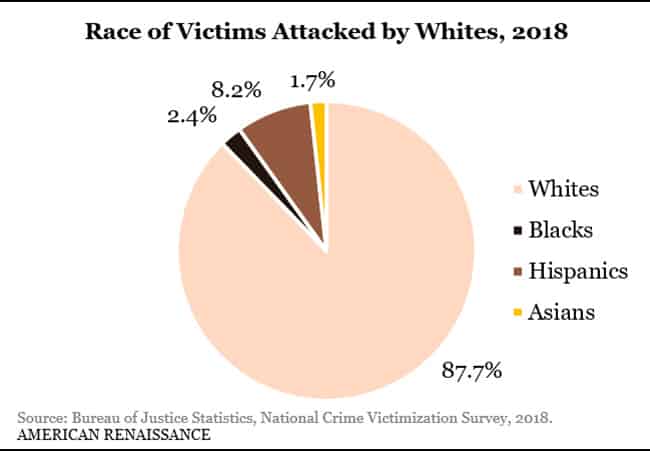
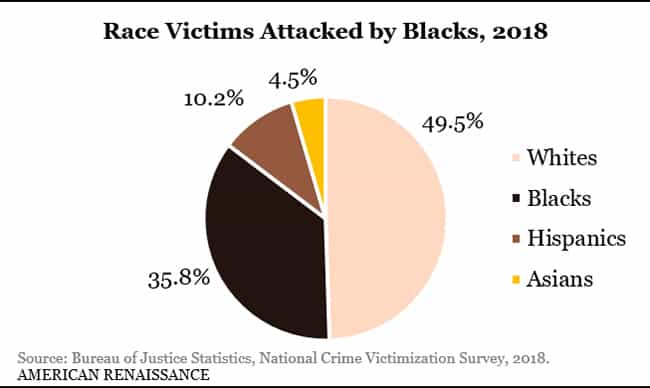
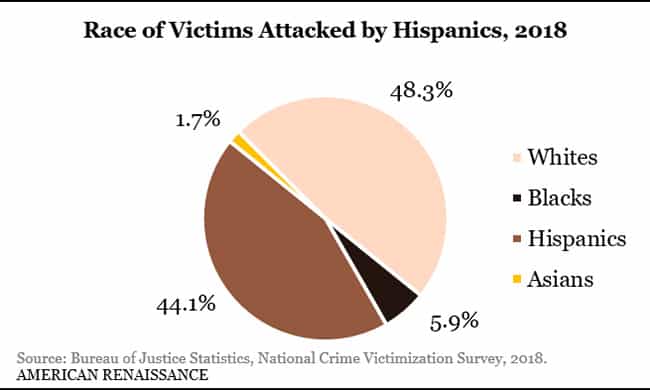
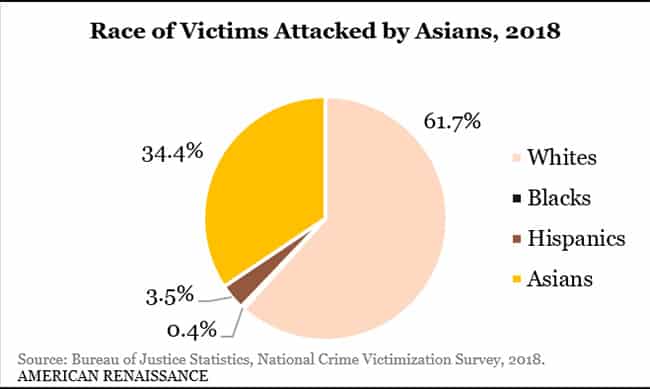
The NCVS gives the percentages of the US population of each race (white: 62.3, black: 12, Hispanic: 17, Asian: 6.3, other: 2.4, so we can calculate the odds of any given black person attacking a white or vice versa:
The odds of a black person attacking a white were 48 times greater than the odds of a white attacking a black.
Blacks were more likely to attack people of every other race more often than they were attacked by them:
47 times more likely to attack an Asian than vice versa, and 3.6 times more likely to attack a Hispanic.
The odds of a Hispanic attacking a white were 6.5 times greater than the reverse. Asians commit crime at lower rates than other racial groups (gambling offenses are the only exception). However, when they do commit interracial violence, they are 18 times more likely to attack a white than vice versa.
The NCVS figures for Asians do not include Pacific Islanders, who have higher violent crime rates than East Asians.
When all non-whites are taken together, the odds of a non-white attacking a white person were 6.8 times greater than those for a white person attacking a non-white.
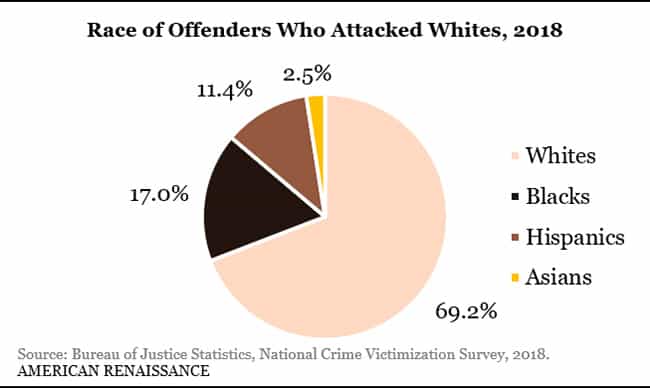
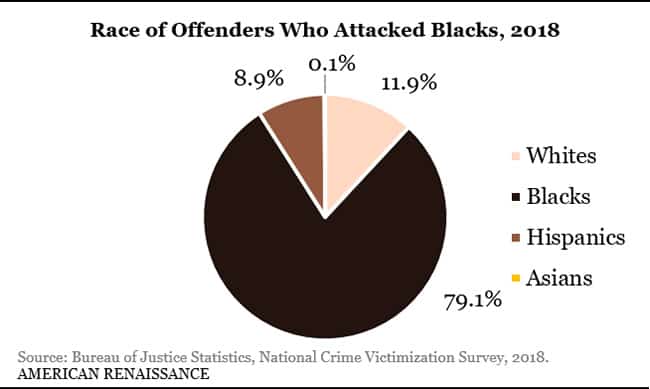
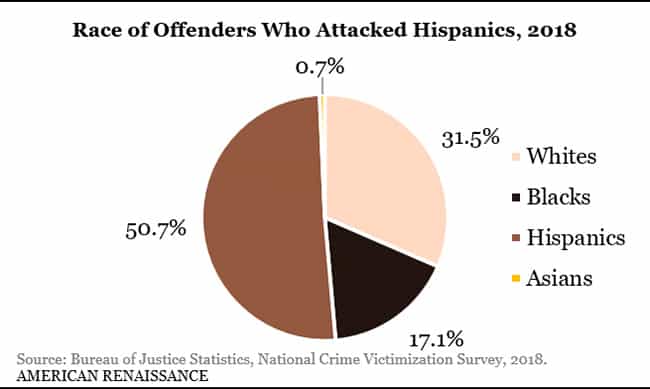
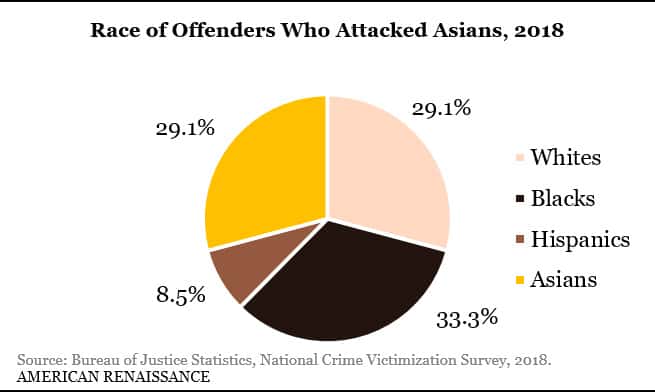
"I did not know that"
ReplyDelete--Johnny Carson
Would've loved to have seen Carson read some of these Jared Taylor statistics off nowadays,like he used to do about ordinary facts-- right after the monologue.Then Ed McMahon would say,
"Well there you have it--everything you wanted to know about race crimes is right there in that column."
"WRONG,jigaboo breath."
"There's MORE?"
"Yes,our crack staff--who are NOT on crack,by the way,came up with a few other facts not found in this column by Jared Taylor.
"84% of the time,when blacks kill another black,they found out later on,that because it was nighttime--they killed the wrong black.
"After blacks are picked up by police for a crime,99.9% of the blacks named Jaquarious or Efremzimbalous,cannot spell their own names correctly.
"87% of the time,when blacks attack a Mexican,it's because there are no Whites around.
88% of blacks think bullets make good Christmas presents--but only if shot from a gun.
"100% of black women in America named Bertha,Tiny and Obesious need to go on a diet.
"98% of the rest of black women in America--need to go on a diet,
"75% of cars stolen by blacks end up totalled within 15 minutes--found smashed into a utility or telephone pole.The other 25% of the cars that survive a longer time,are stolen by OTHER blacks and THEN driven into a utility or telephone pole.
"99% of blacks think that if Covid masks were outlawed,they would start wearing them.
And that's all we have Ed."
"Hi yoooo."
--GRA
Bravo! Once again the real racist problem in America is exposed: Black on White Hate Crime. Yes, America has a racist problem -It's the large majority of Inner City blacks who see white people and their businesses as their rightful prey. The problem is made worse by a Leftist Establishment who champions the worst examples of the African-American Community like common street thugs and murderers - and have the nerve to say white Americans are RACIST! In comparison between the two communities it's the whites who stand out as the anti-racists. Thanks Nick for all the good work you do to expose the truth on racism in America. Article reposted here: https://ronbosoldier.blogspot.com/2021/01/the-real-racist-problem-in-america.html
ReplyDeleteWorse interracial rape. Blacks raping whitey wimmens quite high but almost no instances period of whitey men raping negresses.
ReplyDelete